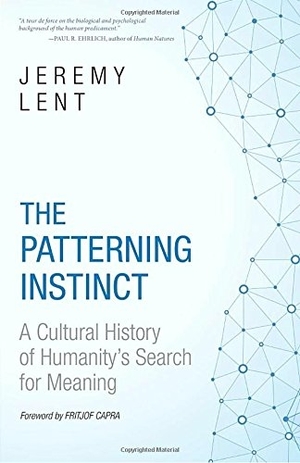Author and ‘integrator’ Jeremy Lent has written a thorough, well-researched and yet readable (not so dense) book around the core theme aptly captured in the author’s quote of “Culture shapes values, and those values shape history” (p.450), in the emerging field of cognitive history (p. 15). The Patterning Instinct takes several disciplines, drawing connections across civilizations, religions, languages and punctuated evolutions. Evolutions like the shift to sedentism and the ‘tragedy of cognition’ with hunter-gathers (p.75), development of prefrontal cortex, origins and need for language, irrigation in Mesopotamia, modern technology advancements, and accelerated climate change. I was also left with a much more profound appreciation for the potential dire results of Moore’s Law as it is playing out today (think Thomas Malthus). Is this a second wave of sedentism?
[alert variation=”alert-info”]Publisher: Prometheus Books
Formats: Hardcover, eBook, Kindle, Audiobook, Audible
Purchase: Powell’s | Amazon | iBooks[/alert]
While reading I found myself constantly intrigued, reflecting on both how we are all more similar than different and the opposing thought of how our differences is what allowed us to change and grow as humans. This was most notable in Part III where Lent dives into the Eastern vs. Western thinking and growth of religion. Lent does not just describe Eastern philosophy and then Western, he does it concurrently highlighting connections, core elements, and key differences. His historical perspective of yoga is something that all modern ‘yogis’ should read (hint: doing handstands is not the point).
I also have a new-found appreciation for Lent’s core concept that language shapes our thinking, which in turn shapes culture and its trajectory. Taking the phrase “I think, therefore I am” as classic Greek/Western sentence structure and translating into Chinese as “thinking, therefore being” illustrates the distinctly different view of self and philosophical tenets.
Still unsure you want to read? He starts out Chapter 1 with a reference to 2001: A Space Odyssey, which gave me hope. In addition, the author’s website provides supplementary content and introductions to covered topics, which I found helpful when reading this book as it falls outside of my area of expertise. I am, however, a curious person, with a love of learning, desire to live a full, meaningful life, have a science based education, but I only took the freshman anthropology course to satisfy the requirement.
I recommend this book. It is not a quick read, but tackles really big questions in an interesting, accessible way, pulling in a variety of supporting evidence from poems, quotes, some modern-day references, all the while encouraging the reader to think about how today’s actions and thoughts are impacting tomorrow. You will assuredly learn something new and pause to consider his thought provoking questions.
[signoff predefined=”Social Media Reminder” icon=”facebook”][/signoff]

